
Mark Cavendish has revealed the depths of the despair he faced before his comeback at the 2021 Tour de France in a new documentary.
In ‘Mark Cavendish: Never Enough’, launching on Netflix on August 2, the Manxman and wife Peta Todd open up about the toll his battle with the Epstein-Barr virus and clinical depression took, and about his fall-out with former team boss Doug Ryder.
Cavendish won four stages of the 2021 Tour to match Eddy Merckx on a record 34, but it came after several seasons wrecked by illness and injury – told in Alex Kiehl’s documentary using new interviews and contemporaneous behind-the-scenes footage.
Cavendish was diagnosed with Epstein-Barr – which can cause chronic fatigue – in April 2017. He was cleared to start that summer’s Tour only for a stage four crash with Peter Sagan to end it.
But the virus had not gone away and his struggles only intensified, putting a strain on Cavendish and those around him.
“You don’t go from being the best in the world to not being even capable,” Cavendish says in the film. “How has it happened? It turned into stress at home. I was a nightmare to live with.”
His wife Peta says Cavendish was “not really him at that moment”, putting pressure on their marriage. “We argued about nothing. He was so lost in everything that was going on.”
Later in the film, Peta adds: “I didn’t know this version of him, but I was sleeping in the same bed… I was scared that I would go past my limit and not be able to come back again.”
The tension was not limited to Cavendish’s private life. Team Dimension Data signed him in 2016 to elevate them to the WorldTour level and he delivered four Tour stage wins in his first season.
But once his illness began, the dynamic changed. Things came to a head during the 2018 Tour, where Cavendish’s best result was eighth before he missed the time cut on stage 11 to La Rosiere.
Days before, Ryder had called Dimension Data “a sinking ship” and called a team meeting. It was to prove a pivotal moment in the relationship between Cavendish and Ryder, who would leave his star rider out of the Tour the following summer against the advice of sports director Rolf Aldag.
Recalling the exchange, Cavendish says: “Doug starts off, ‘I’m getting it in the neck from the sponsors, we’re not anywhere near it. This isn’t good enough’.
“I’m like, ‘Doug, all the stuff you’re saying. You’re the one that signed the contracts. Don’t put that on us. We’re doing our best’. And he didn’t like me saying that. And he stormed off the bus.”
Ryder declined to be interviewed for the film, but Kiehl used behind-the-scenes footage gathered by his team with their blessing.
After the Tour Cavendish visited his former team doctor Helge Riepenhof. Tests found Epstein-Barr was still present and Cavendish should not have been racing. He was also diagnosed with clinical depression and almost admitted to hospital.
“I wasn’t sure if he would get out of the depression without quitting cycling,” Riepenhof says. “(Whether) to recommend he stop cycling and leave all the pressure and start a different life.”
Dimension Data then brought in psychologist David Spindler at a time when, according to Aldag, Cavendish was telling people his career was over.
Recalling the place Cavendish was in, Spindler says: “I think there’s a high risk that you harm yourself or even that you commit suicide. Mark and I made a deal. I said, ‘Before you do something to yourself, call me’.”
The latter part of the film is more uplifting. After a pandemic-disrupted season with Bahrain-McLaren, Cavendish was offered a career lifeline by his old boss Patrick Lefevere going into 2021, and that remarkable summer followed.
Cavendish was hoping for a record-breaking 35th stage win and a fairytale ending this July after announcing his plans to retire this winter, but a broken collarbone on stage eight scuppered that dream a day after he came so close in Bordeaux.
Astana-Qazaqstan boss Alexander Vinokourov still hopes to convince him to race on, and may take note of Cavendish’s closing comment: “I will continue trying to win for as long as I believe I can win.”







